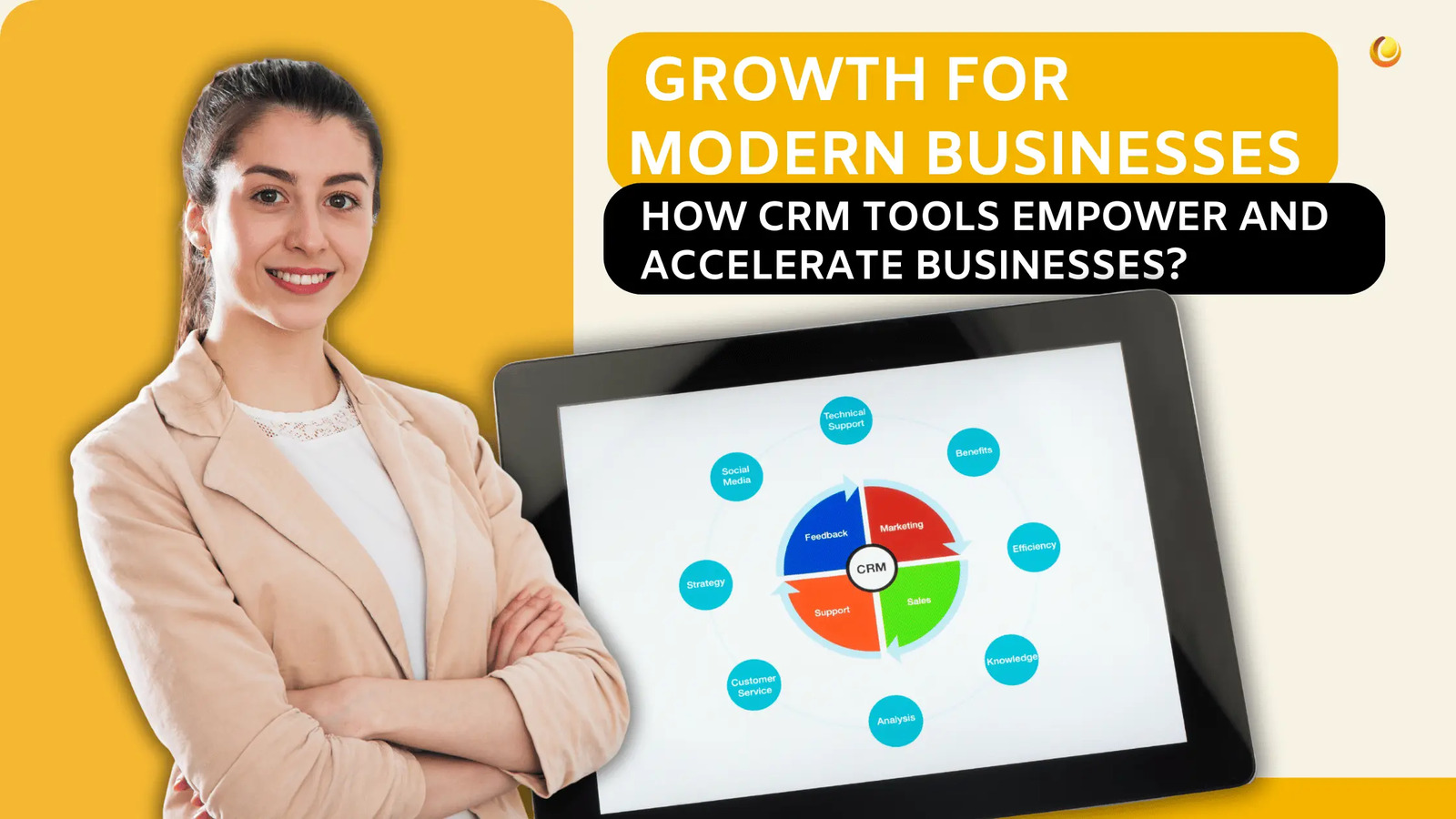
What Are CRM Tools?
CRM tools are software that helps businesses manage customer interaction. All customer-related data gets centralised in one place leading tracking to managing sales pipelines and even automating marketing through CRM tools. Businesses require CRM tools if they wish to give customers personalised services, forge closer relationships, and ultimately keep ahead of their competition.
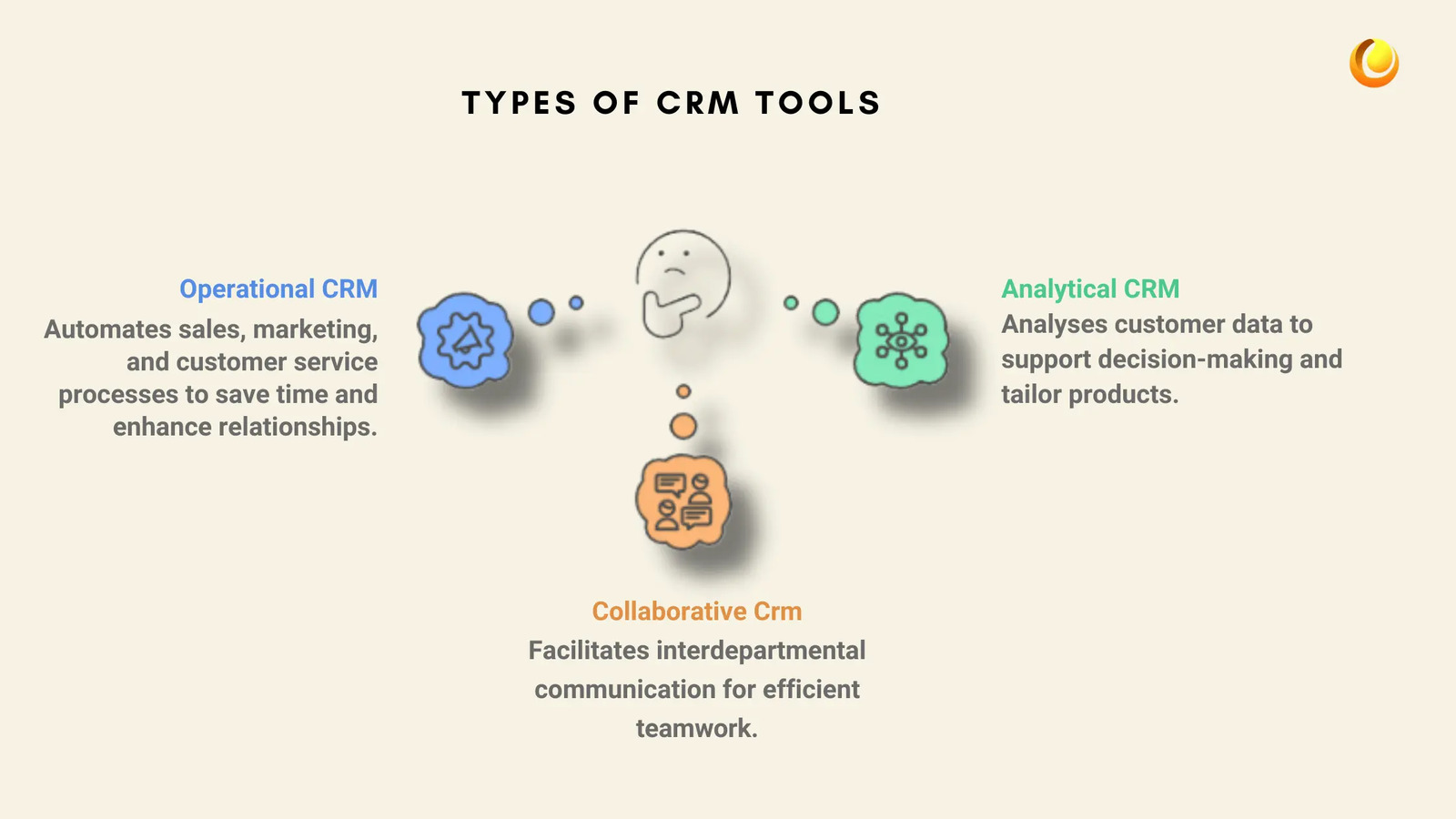
Types of CRM Tools
Three main types of CRM satisfy different business needs.
Operational CRM: It primarily automates sales, marketing, and customer service processes. For example, Zoho CRM automates lead generation, follow-ups, and email campaigns so that teams can save time and spend more time building relationships.
Analytical CRM: Analyses customer information to support decision-making. Salesforce Analytics provides organisations with insights about their customers' activities, enabling them to predict patterns and tailor products according to data insights.
Collaborative CRM: Facilitates proper interdepartmental communication. HubSpot CRM enables the sales, marketing, and service teams to communicate in one place for an efficient department experience.
Why Are CRM Tools Crucial for Businesses?
CRM tools are investments in enhancing customer relationships, automating task performances, and making data-based decisions. The tools consolidate customer information, make workflows smooth, and team collaborations are improved. All this results in an increased efficiency of the firm that would foster customer loyalty which finally leads to bottom-line growth.
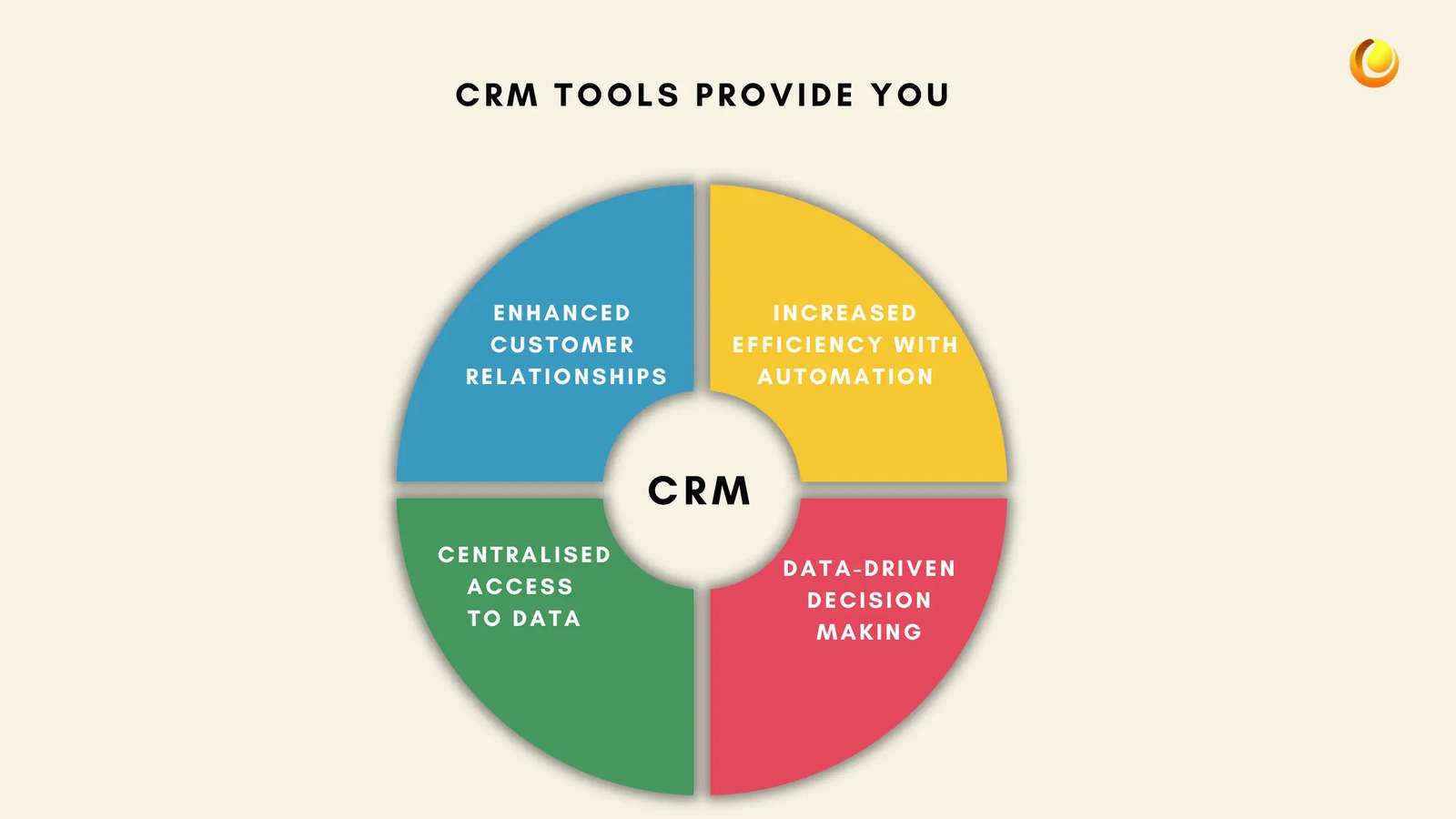
Enhanced Customer Relationships: CRM tools provide a clear view of the customer. It tracks their preferences, purchase history, and past interactions to allow a business to develop tailored marketing strategies as well as personalised communication that affects each client, thereby making that client loyal and enhancing customer retention.
Increased Efficiency with Automation: Activities like follow-up emails, updating contact records, and scheduling reminders are significant time-consuming tasks when manually handled. CRM software automates repetitive work, thereby saving time and reducing the possibility of human error. In this manner, the work of your team gets free from some high-value tasks such as strategy development and relationship building.
Data-Driven Decision Making: The CRM system gives reports and analytics in totality, which will give business insight into trends of sales, customer behaviour, and how the marketing is doing. By using all this data, the business will decide accordingly based on the needs of customers and market demands to make their overall strategies effective for them.
Centralised access to data: It collects all information of customers at a single location that varies from the organisation's different teams, and it will make sure that sales and customer service possess the most updated information and encourages collaboration, reduces errors, and makes sure that one customer detail is not missed.
Key Features of Effective CRM Tools
Key selection criteria for a CRM tool should include the following key features that will satisfy its intended use:
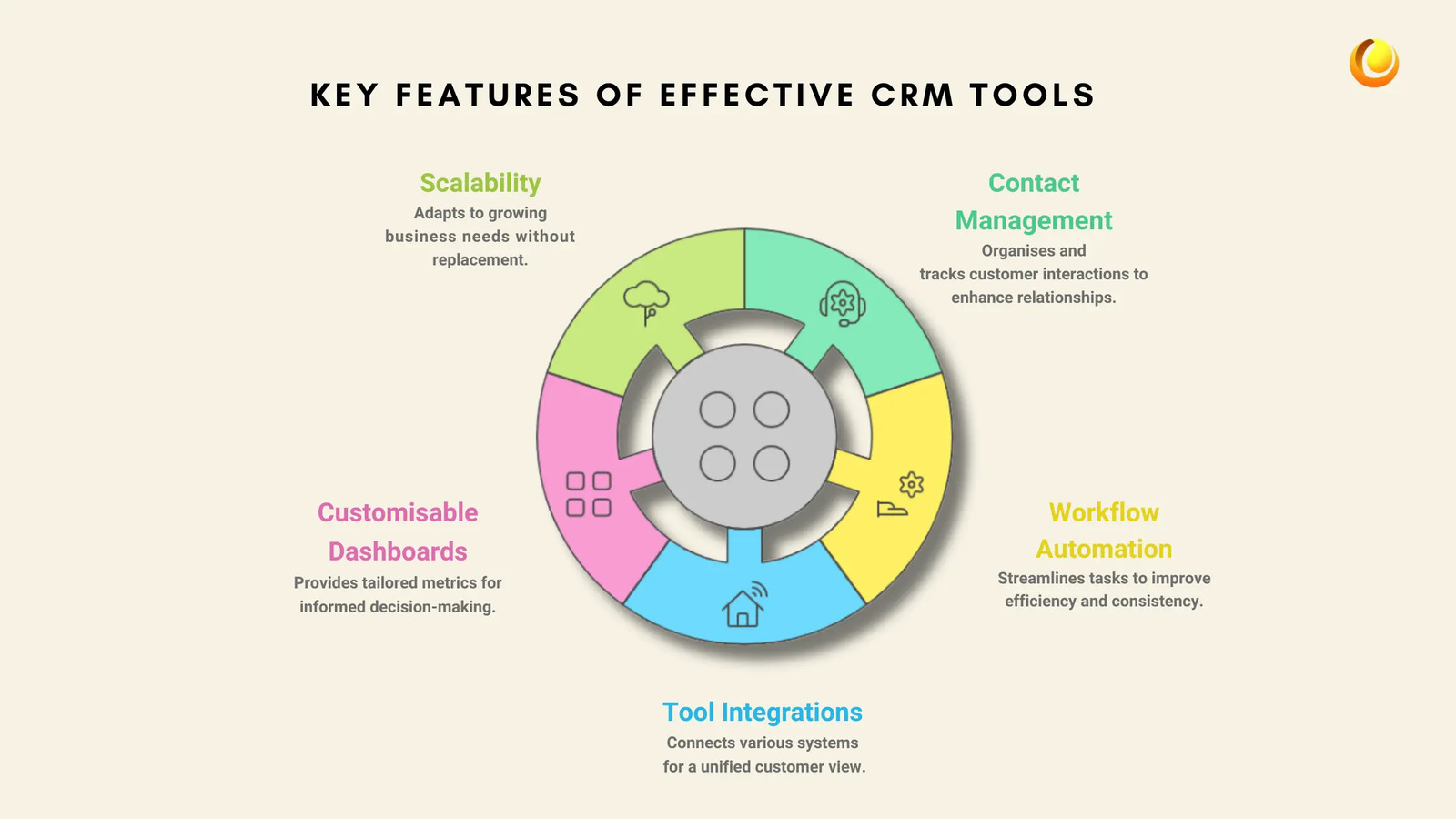
Contact and Lead Management: An effective CRM tool helps businesses categorise and manage leads appropriately. It tracks customer interactions and ensures that no opportunities are missed. This aspect is crucial for relationship nurturing and conversion. For instance, in HubSpot CRM, businesses can track and categorise leads so that no opportunities are missed, logging every interaction with a customer. You can also utilise Zoho's Web to lead automation.
Workflow Automation: Automates routine activities like sending welcome emails, follow-up reminders, and even data entry. Such automation saves many hours of human work; efficiency increases along with consistency in communication with customers. Zoho CRM follows follow-up emails or reminders automatically, saving time and improving consistency in communication. You can learn more about workflow automation in Zoho in our blog post.
Integrations with other tools: A CRM should seamlessly integrate with other tools, such as email, social media, and marketing tools. It means a unified experience throughout all the systems and therefore allows having a complete view of the customer interactions while streamlining the processes. Salesforce is integrating with many tools such as email platforms and social media for smooth workflow across all business systems.
Customisable Dashboards: Customisable dashboards are important for monitoring the most relevant metrics and KPIs for your business. Business organisations can focus on key performance indicators, track goals, and make informed decisions based on real-time data by using customisable dashboards. Pipedrive provides customisable dashboards that allow business organisations to focus on such key metrics as sales stages, conversion rates, and goals.
Scalability: Once a business grows, the CRM tool chosen must also scale with it. It should accommodate large volumes of data and rising numbers of users with potentially more complex workflows. The scale will allow the CRM system to sustain your business's needs but not need to replace your whole CRM system. Microsoft Dynamics 365 scales with your business - more data, more users, even more complex workflows - making your CRM relevant as your business continues to grow.
Top CRM Tools for Businesses
CRM tools are designed to handle customer relationships; automate workflow; and enhance how teams interact. In 2024, there are numerous forms of CRM that businesses can find and apply according to differing needs. Here is in-depth detail on seven great CRM tools that suit one type of business or another:
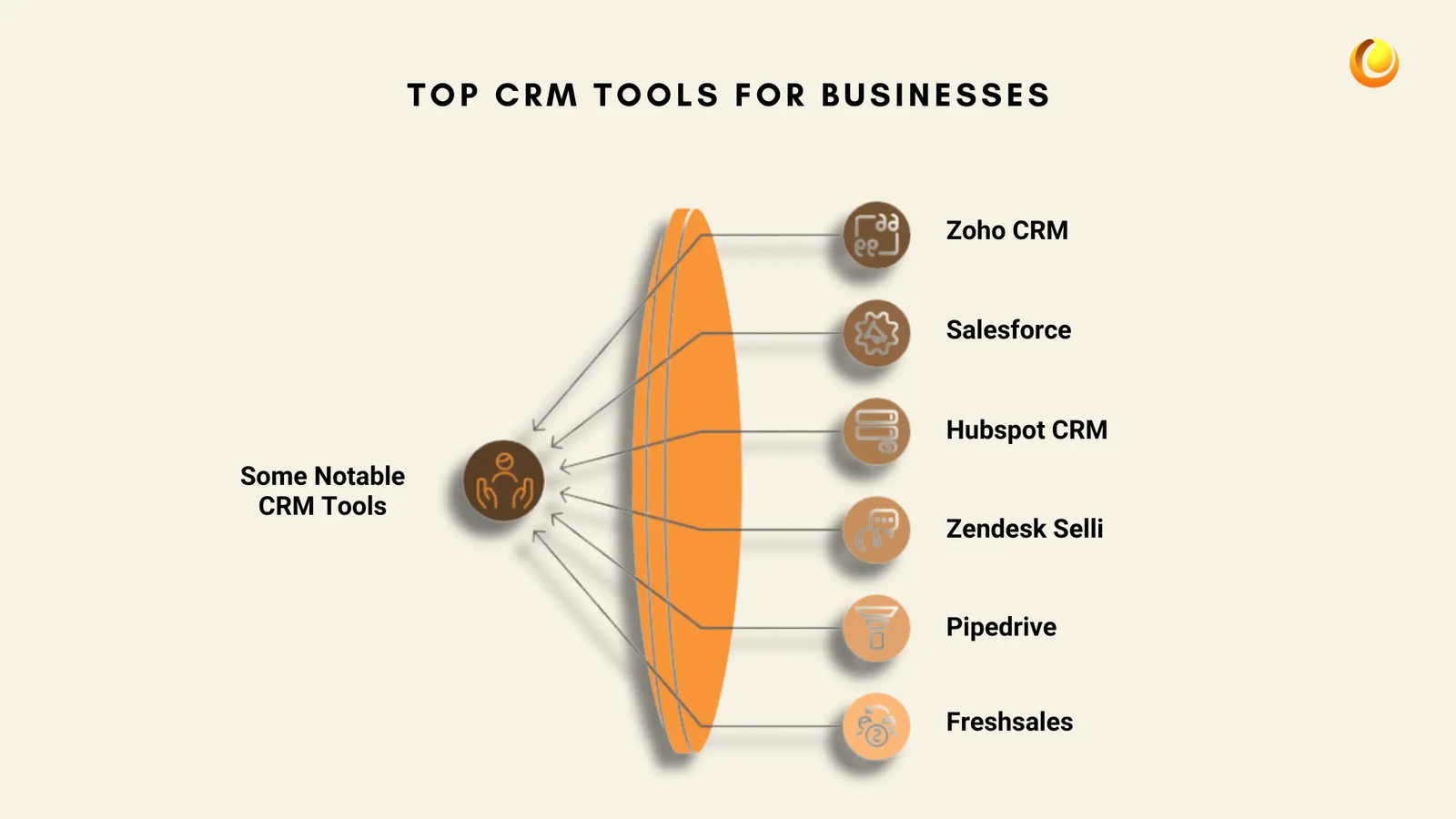
1. Zoho CRM
Ideal for Small and medium enterprises and large enterprises.
Zoho CRM is a strong and full-fledged solution for any business, big or small. It offers deep customisations, and automation, and has a powerful set of integration options. With its analytics powered by artificial intelligence, along with multichannel communication, Zoho CRM helps businesses gain critical insights in engaging customers across multiple touchpoints. Its scalable design makes it a great fit for growing businesses looking for a solution that evolves with the business.
Key Features:
AI-powered analytics: Zoho CRM uses artificial intelligence to analyse data and provide predictive insights.
Multichannel communication: Offers integrated tools for email, social media, live chat, and more.
Customisable workflows: Businesses can tailor workflows to meet their unique processes and customer journeys.
2. Salesforce
Best for Enterprises and businesses requiring extensive customisation.
Salesforce has been the undisputed leader in the CRM space for ages, offering unparalleled flexibility and advanced tools for large-scale enterprises. Its cloud-based platform is perfect for organisations that have complex workflows and diverse needs. Salesforce is easily integrated with third-party applications and is known for its robust customer support, which makes it a go-to choice for businesses with intricate CRM requirements.
Key Features:
Advanced analytics: The analytics tools in Salesforce offer detailed insights into customer data and the performance of sales.
Marketing automation: It offers a power automation feature from campaign management to customer journeys.
Seamless integrations: Its integration with a variety of business applications and services unifies everything on a platform.
3. HubSpot CRM
Best for: Startups and small businesses.
Hubspot CRM is best for start-ups and small businesses, considering it has an intuitive interface with a free robust plan. This makes it very user-friendly, even for a newcomer to CRM tools, while providing essential features for managing the sales pipeline of a small business, customer interaction tracking, and growing leads. HubSpot also has numerous marketing tools that can integrate with its CRM, so it is great for companies that want all-in-one functionality.
Key Features:
Email tracking: track email opens and clicks to understand lead engagement
Lead nurturing: automate follow-up and nurture leads with the right email sequences
Sales pipeline management: Easily manage deals and track moves in the pipeline through an interactive tool.
4. Zendesk Sell
Good for: Customer-centric businesses.
Zendesk Sell is one tool that is designed specifically to simplify sales processes, improve productivity, and enhance profitability. It's ideal for customer-centric business ventures. The tool facilitates sales pipeline management, collaboration improvement, and effective lead tracking for teams. It integrates seamlessly with Zendesk’s customer service platform, making it a comprehensive solution for businesses that prioritise customer experience.
Key Features:
Sales pipeline visualisation: you can track the progress of deals very easily & identify issues in the sales process.
Automation: Automate routine tasks such as follow-ups and updates to keep the sales team focused on high-value activities.
Contact management: Keep detailed records of customer interactions to improve relationship management.
5. Pipedrive
Suitable for Small to medium-sized sales teams.
Pipedrive is created especially for sales teams in mind. The application is highly visual and provides a deal-tracking mechanism. It has an intuitive interface and drag-and-drop features, making it easy to track deals, monitor progress, and collaborate across teams. Pipedrive is particularly valuable for businesses that want to visualise their sales pipeline and focus on converting leads into customers.
Key Features:
Deal tracking: Pipedrive’s visual pipeline allows businesses to track deals at various stages.
Customisable pipelines: You can customise your pipelines according to the sales process of your business.
AI-powered suggestions: The system offers intelligent insights to help businesses prioritise the most promising leads.
6. Freshsales
Best for: Small businesses and teams that need an all-in-one solution.
Freshsales CRM, part of the Freshworks suite of tools, is an excellent choice for small businesses seeking a straightforward CRM solution that integrates well with other tools. This is particularly great for businesses that need contact management, sales tracking, and communication tools in one tool. Freshsales provides a user-friendly interface and is easy to set up, making it an attractive offer to businesses just starting on their CRM journey.
Key Features
Built-in phone: Freshsales lets teams place calls from directly within the CRM.
Sales activity tracking: Track every interaction with customers, including emails, calls, and meetings.
Integrations of email and chats: Simplify communication through integrations with email and live chats.
7. Monday.com CRM
Best for Teams juggling project management and CRM needs.
Monday.com CRM is an all-in-one versatile platform combining CRM functionalities with project management tools. It, therefore, becomes especially important for businesses that need to handle customer relationships and internal workflows in a single platform. This means businesses can customise their workflows, track progress, and maintain the alignment of teams about the interactions with customers and deliverables. This software is ideal for teams dealing with multiple projects and CRM needs on one platform.
Key Features:
Flexible workflow design: Design workflows as they want can be applied when making deals to sales, marketing, and then project management.
Collaboration: Monday.com amplifies team collaboration using board sharing and task management skills.
Reporting: Monday helps in tracking the project, and sales performance, with available reporting features.
Right CRM tool selection plays a key role for businesses of every size. A small business just starting to expand, a large enterprise requiring an extensive, scalable system, and the right CRM tool make all the difference for a better customer relationship, more sales productivity, and an overall better-performing business.
Zoho CRM, Salesforce, HubSpot CRM, Zendesk Sell, Pipedrive, Freshsales, and Monday.com- all feature uniqueness that is especially suited for different business requirements.
How to Choose the Right CRM Tool?
To select the best CRM tool for your business, you should always consider your needs carefully. An ideal CRM solution should align with your set goals, workflows, and available resources. Here are some key factors that you should consider:
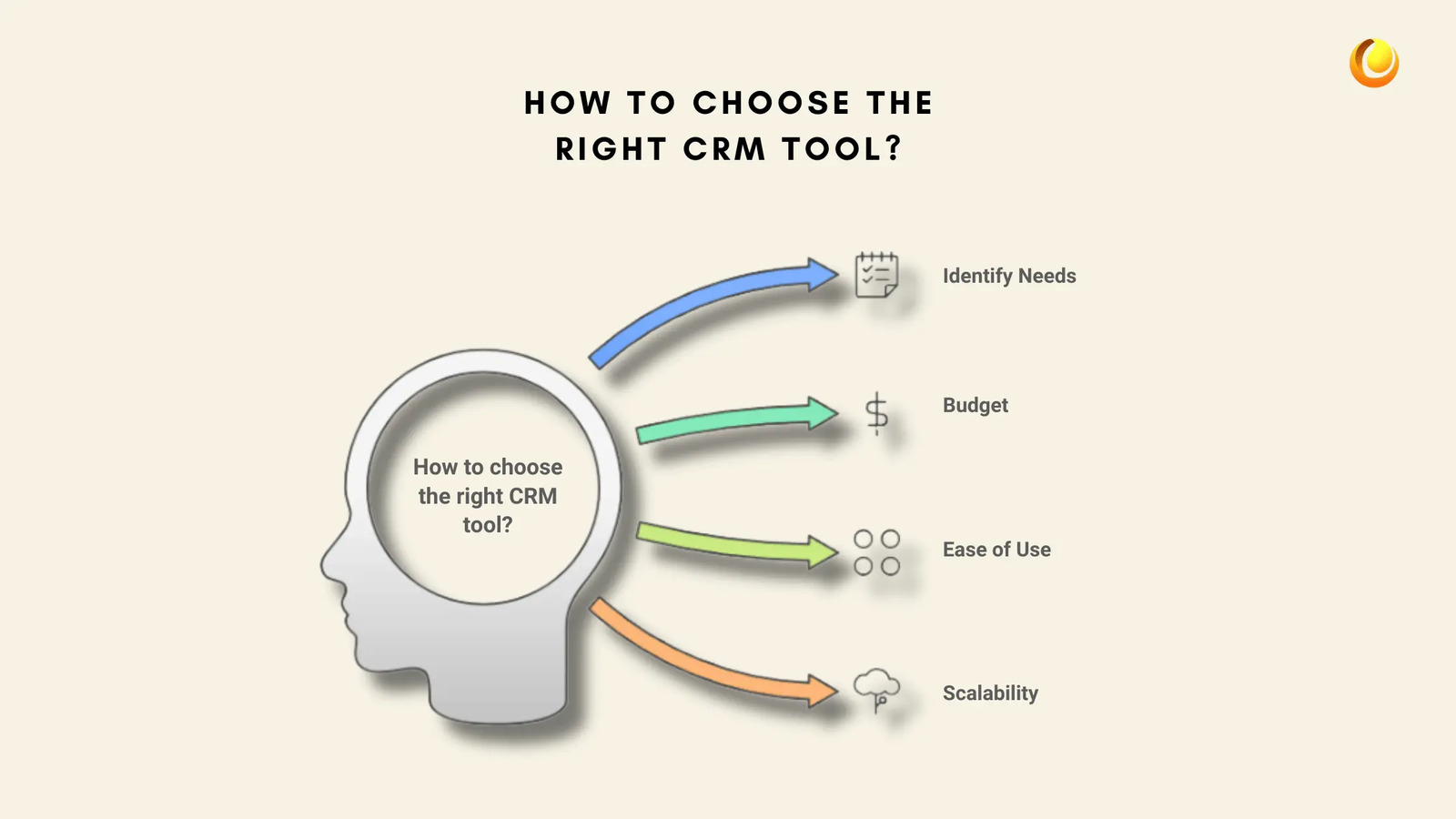
1. Identify Your Needs
First off, when selecting a CRM tool, define what you need from it. Different businesses have different needs. For example, if customer service is foremost, you will require a CRM that allows tracking and managing customer service tickets. If a focus is on sales and marketing, the CRM may be required to automate email campaigns, nurture leads, and integrate data from social media. Knowing your core requirements will ensure that you select a CRM with the features you need - lead management, reporting, and analytics, for instance, which are in alignment with your business goals.
2. Budget
Selecting a CRM tool also calls for consideration of your budget. While some CRMs provide free plans with basic functionality, others can be quite costly, especially those with comprehensive features or premium support. Set a budget that accommodates the features you need but also ensures a good return on investment (ROI). Small businesses might start with more affordable or even free CRM solutions and upgrade as their needs grow. Larger enterprises may require advanced, customisable CRMs with higher price points but offering powerful integrations and scalability. Many times you will need an expert in CRM.
3. Ease of Use
A good CRM must be user-friendly with a not-so-complicated interface for the team to utilize easily. If the CRM system is hard to understand and use, adoption is low, and this results in its inability to be fully utilised for a business. Choose the best CRM that offers straightforward, user-friendly dashboards and work processes with minimal training and understanding. Some examples are highly valued for their user-friendly simplicity, such as those in HubSpot CRM and Pipedrive.
4. Scalability
A good CRM tool should scale with the growth of your company, handling more users, data, and complex workflows. In evaluating scalability, consider whether the CRM can handle additional users, advanced features, and larger volumes of customer data. Scalable platforms such as Salesforce and Zoho CRM could be ideal for every size of business ranging from small startups to large enterprises.
5. Integration Options
The CRM tool you choose should also integrate with other tools your business uses, such as an email platform, social media, accounting software, or e-commerce systems. You will find that integration options are crucial in streamlining processes and ensuring data consistency across systems. For example, if a business integrates a CRM with email marketing software, then it will help you to reach out more personally to customers. A good number of CRMs include Zoho and Salesforce with numerous integrations with third-party apps that help streamline workflow and efficiency.
Selecting the right CRM tool needs to be a thorough consideration of your business's needs, budget, usability, scalability, and integration requirements. The right CRM tool will meet your current business needs while supporting the growth of your company. Whether you need an easy-to-use solution for small teams or a complex system for large enterprises, there is a CRM tool that will fit. Here are some way to help you pick better CRM for you business.
Implementation Tips for CRM Success
To implement CRM rightly, a strategic approach is mandatory:
Set Clear Objectives: Before rolling out the CRM implementation process, define specific goals such as conversion of sales or better service to customers. Proper objectives bring the features of a tool in line with the needs of your business.
Train your team: Educate them on what the CRM offers in functionalities. With regular training, your team will understand it better, and adoption will improve alongside performance.
Customise the System: Tailor the CRM according to your business workflows. Customisation will make the CRM fit perfectly in your operations, thus streamlining processes.
Regular Maintenance: Data that is maintained within the CRM must be recent and updated because the system has to be audited periodically to ascertain its correctness and efficiency. Regular maintenance ensures the continued support of the CRM for business goals and that the resultant data generated are trustworthy.
Conclusion
Today, businesses look up to such CRM tools to be ahead in this customer-centric world. In any field, these provide extensive use, starting with handling the relationships and ending by working on the data-driven strategy for further advancements. Whether it's a small start-up or a huge companies, one can easily get CRM for their businesses as well. CRM is all about knowing your customers and markets better and providing a superior customer experience. However, many business owners commit mistakes in listing their requirements and end up mismatching the CRM tool. To avoid all this, it would be helpful to consult a professional CRM consultant.
And then comes the choice of the appropriate CRM tool. Proper implementation is the key to the optimum results. Of course, at first glance, it may seem to stretch your budget but the return on investment is invaluable. Whether you build an internal team or work with a CRM agency, both can work.
If you’re considering implementing a CRM system, then you can connect with IT Solutions Solved, we have all the resources that any business needs for its CRM customisation and implementation.
Explore the options, implement the right solution, and watch your business thrive. Start your journey with the best CRM tools today and take your business to new heights.





